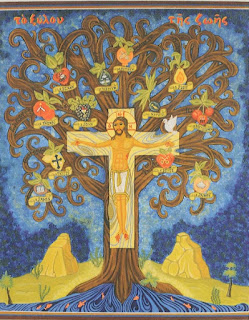On Spiritual Gifts in the Ancient Church
 |
| St. Symeon Ablaze with the Life of Christ, Like the Most Holy Theotokos and the Burning Bush |
“Though I speak with the tongues of men and of angels, and have not charity, I am become as sounding brass, or a tinkling cymbal. And though I have the gift of prophecy, and understand all mysteries, and all knowledge; and though I have all faith, so that I could remove mountains, and have not charity, I am nothing. And though I bestow all my goods to feed the poor, and though I give my body to be burned, and have not charity, it profiteth me nothing.”
- I Corinthians 13:1-3
By Bp. Joseph (Ancient Church of the West)
In the West there is a prevalent view known as “Cessationism” that believes all Charismatic gifts ceased to exist after the writing of the New Testament Canon. They use St. Paul’s exhortation in I Corinthians 13:10, “When that which is perfect comes, that which is in part shall pass away”, to support this view. While it is certainly true that things like the “Gift of Tongues” did become rarer once the Gospel had spread to the four corners of the ancient world, the Saints continued to exhibit power to heal, authority over devils, divine knowledge and occasional miracles like opening springs of water, taming wild predators, and talking with animals.
 |
| The Seven Spirits of Virtue Pouring Forth Upon the Holy Theotokos and the 12 Apostles at Pentecost, from the Apse Mosaic of the Basilica do Rosario, Lourdes, France |
There is an Eastern saint and theologian who wrote mostly about this issue, a mystic saint named St. Symeon the New Theologian. His teaching maintains that God never "retired" any of His gifts, because they are evident throughout history (he was a 9th century pastor and ascetic), whenever God chose to use finite and limited people to proclaim the Gospel of Repentance toward God and Love for Christ. But, he cautioned that they were given to strengthen the body and can only be used in unity with the Church, not as a reason for division.
“That human being who is inwardly illumined by the light of the Holy Spirit cannot endure the vision of it, but falls face down on the ground and cries out in great fear and wonder, because he has seen and experienced something that is beyond nature, thought, or conception. He becomes like someone suddenly inflamed with a violent fever; as though on fire and powerless to control the flames, he is beside himself, totally incapable of controlling himself. And though he weeps incessant tears that bring some relief, the flame of his desire breaks out even more intensely. Then his tears flow even more abundantly and washed by their flow, he becomes even more radiant. When, utterly incandescent, he has become like light, then the saying of Saint Gregory of Nazianzos is fulfilled, "God is united with gods and known by them" in the sense perhaps that he is now united to those who have joined themselves to him, and revealed to those who have come to know him.” - St. Symeon the New Theologian, The Philokalia: The Complete Text, vol. 4 (London: Faber & Faber, 1995)
According to St. Symeon, being filled with the Holy Spirit brings unity, not division. Even during the days of the Early Church, those with "charismatic gifts" were often using their powers to try to critique the Church Catholic, rebel against the Bishops, break apart the Body, and teach new doctrines that were at variance with the Apostolic Teaching. The Montanists were one such group, who, while pointing out the lukewarm faith of the established Church and the rampant sin of clergymen, introduces the heresy of women’s ordination and eventually came to believe that their founder, Montanus, like Muslims would later believe of their founder Mohammad, was the “Paraclete” of Jesus Christ and the Holy Spirit incarnate.
 |
The Fruits of the Spirit Grows on the Tree of Life, Jesus Christ and His Sacrifice on the Cross |
Whenever "gifts" divide, the reveal themselves to be demonic; the very word in scripture for devil is "diabolos" - "divider"! That is why St. John tells us to "try the spirits", because all demons "appear as angels of light" (2 Cor 11:14), and it is only within the teaching of the Incarnation (that Christ is God), that we can discern what is of God and what is of the devil. That's not only the message of trying the spirit of our gifting that is found in 1 John 4:1-6, but it is what St. Paul seems to be saying in I Cor 14:18-19, when he says that the gift of tongues is inferior to that which edifies the body as a whole.
St. Paul lists spiritual gifts four times in his letters, but as a way of showing that there is no "superior" and "inferior" gifts, but that all the functions of those in the Body of Christ are necessary… that the eye can't say to the ear that he is unnecessary! (I Cor 12:21-27) And, this is also true for the Orthodox understanding of those who serve in the Church as clergy - they do not have status or a higher place based on their ordination, just different roles that are held together with the whole body of the faithful through love of Christ.
When we allow our gifts to be thought of as more important, not only are they an excuse for sin, but reveal their origins to be other than God.
 |
| The Gifts of the Holy Spirit Found in the Laying On of Hands and the Sacrament of Holy Chrismation |




Comments
Post a Comment